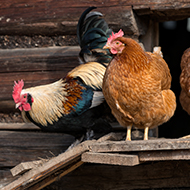
“This will be welcome news for poultry keepers across the country” - UK's CVOs
Compulsory housing measures for poultry and captive birds, introduced in December to prevent the spread of avian influenza, are set to be lifted from 31, March 2021 the UK’s chief veterinary officers have confirmed.
The announcement comes after the Animal and Heath Plant Agency (APHA) reduced the risk of avian influenza in the UK to medium. The Avian Influenza Prevention Zone and mandatory biosecurity measures will, however, remain in place.
Bird keepers are encouraged to use the coming weeks to prepare outdoor areas for the release of their birds.
A joint statement from the UK’s chief veterinary officers read: “This will be welcome news for poultry keepers across the country who have put great effort into keeping their flocks safe this winter.
“We have taken swift action to contain and eliminate this disease and all bird keepers - whether they have just a few birds or thousands - must continue to do their bit to maintain strict biosecurity measures on their premises so that we do not lose the progress that we have made over the past few months as Low risk does not mean No Risk.”



 The Federation of Independent Veterinary Practices (FIVP) has announced a third season of its podcast, Practice Matters.
The Federation of Independent Veterinary Practices (FIVP) has announced a third season of its podcast, Practice Matters.